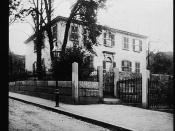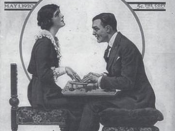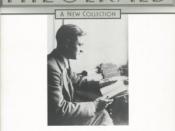Disillusionment is the act of disenchanting, especially to disappoint or embitter by leaving without illusion. Disillusionment, or the death of a dream, is a prominent them in Fitzgerald's "Winter Dreams," and Wolfe's "The Far and the Near." In both short stories the main character clearly embodies the theme of disillusionment. In "Winter Dreams," Dexter Green experiences disillusionment, and In "The Far and the Near," the engineer experiences the death of his dream as well.
Both short stories convey a main character that experiences a type of disillusionment. Both of the characters, Dexter Green, and the engineer, are dreaming of a perfect life or the life they believe they want to have and are both left disappointed and hopeless as the end of the story. Their dreams are shattered when things do not end up the way they have envisioned them.
The main character, Dexter Green, in the short story "Winter Dreams," by F. Scott Fitzgerald is ambitious in that he wants to pursue his winter dreams.
"He wanted not association with glittering things and glittering people - he wanted the glittering things themselves."pg. 748. Dexter Green's winter dreams are obviously to be rich which he does accomplish in the story by starting a laundry mat chain, but he finds himself unhappy and lonely because he does not have the woman who he loves and she is with someone who treats her very bad. When Dexter says "Long ago there was something in me, but now that thing is gone. Now that thing is gone. I cannot cry, I cannot care, That thing will come back no more," his dreams of a happy life are shattered because the woman he loves is unhappy. This is when the main character of Dexter Green experiences disillusionment.
The main character, the engineer, in the short story "The Far and the Near," looks forward to his passing of a house everyday on his train where a woman stands out on her porch every single time and waves to him. The wave affected him everyday and he thought about it all the time. He grows old and throughout his life, thoughts of this woman and her generous wave that he looked forward to everyday are what keeps him happy. He imagines his life with her and what she is like. He dreams of a happy life and someday knows that he will meet this woman. At the end of the story the engineer finally goes to the old woman's house in order to meet her, expecting the woman of his dreams, he is shocked to find a mean, ugly old woman whom he has absolutely nothing in common with. "And instantly, with a sense of bitter loss and grief, he was sorry he had come. He know at once that the woman who stood there looking at him with a mistrustful eye was the same woman who had waved to him so many thousand times." She was obviously just waving to for no reason at all, and throughout his entire life, the engineer believed it was more than that. The engineer experiences disillusionment when he finds out their was absolutely no meaning behind the woman's wave.
Disillusionment is obviously a prominent them in the literature of this period. It clearly surfaces in Fitzgerald's "Winter Dreams," and Wolfe's "The Far and the Near." In both short stories, the main characters, Dexter Green and the engineer, embody the theme of disillusionment.



